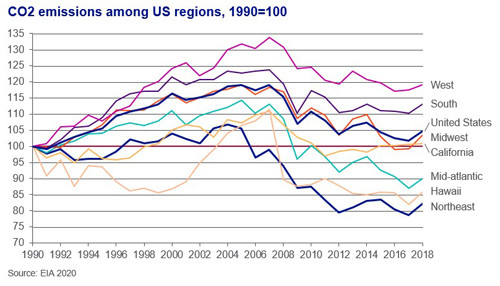

The critical decade: 2030 milestones on the US road to net zero
The United States is back at the table in the fight on climate change and we do not have a day to waste. The next decade is critical. Here, Badar Khan, President of National Grid US, shares his thoughts on the action required in the next decade to combat climate change.
We need to make significant headway on reducing carbon emissions by 2030, if we are going to avoid the worst impacts of climate change and reach net zero by 2050. This was affirmed by the Biden Administration this week, when the President announced a new national target to reduce carbon emissions by 50-52% from 2005 levels by 2030.

The Northeast US has already made good progress, reducing emissions by nearly 20% since 1990; more than any other US region. But we still have a lot of work to do.
We have picked the low-hanging fruit, including phasing out coal and investing in energy efficiency measures such as LED lighting. Tackling the remaining emissions will require deeper retrofits, more customer engagement and transformation of our energy systems, all at an unprecedented pace of change. To achieve net zero, we need to make two major shifts.
1. Decarbonize energy supply
We need to accelerate the transition by ramping up clean energy deployment, all while meeting a growing demand from electrification, to achieve at least an 80% zero-carbon electricity supply by 2030. That’s why President Biden’s recent commitment to advance 30 gigawatts of responsible offshore wind development by 2030 is so critical.
The Northeast, where National Grid operates, is well-positioned as a major offshore wind hub and offshore wind has the potential to meet a large share of electricity demand. Large-scale renewables like wind could also be used to create green hydrogen through electrolysis, which can be stored and used to offset seasonal variation in supply and demand. We will also need hydrogen and other low-carbon molecules, such as renewable natural gas (RNG), to meet demand in sectors that are hard to decarbonize, such as industry, heavy transport and heating.
The market for these low-carbon fuels must be developed and scaled significantly over the next decade.

2. Change the way customers use energy
We need to change the way customers use energy, paying particular attention to the transportation and building sectors. To stay on track, roughly 50% of all vehicles on the road in the Northeast must be electric by 2030 – that’s 10 million vehicles. National Grid has committed to transforming its passenger vehicle fleet to 100% electric by 2030 and we’ve launched programs in New York and New England to help our customers and communities do the same.
Building heat will require another enormous shift. By 2030, we’ll need to double the rate of energy efficiency retrofits and convert nearly all of the Northeast’s 5 million oil-heated buildings to cleaner solutions, such as heat pumps. For buildings that heat with natural gas today, we will also need to transition away from delivering geologic natural gas to providing customers with low- and zero-carbon RNG and hydrogen.
Our new national decarbonization target represents a key milestone in the leadup to the 26th UN Climate Change Conference of the Parties (COP26) in Glasgow in November. In the most critical meeting since the Paris Agreement in 2015, world leaders will come together once again to agree a path forward. National Grid is a Principal Partner of the conference, because we recognize the scale of the transformation required in the coming years and we are as committed as ever to being part of those solutions.
As the owner and operator of energy networks that deliver power and heat to 20 million people in the Northeast US, we are committed to accelerating the transition to clean energy in a way that is fair and affordable for all customers and doesn’t leave anyone behind.
Now, one year into the most critical decade, is the time to build on our progress and hold ourselves accountable. The task ahead of us is expansive and challenging but, with all hands on deck, we are optimistic. With policymakers, regulators, entrepreneurs, businesses and customers all working towards a shared goal, meeting our ambitious national and global climate commitments is achievable.


